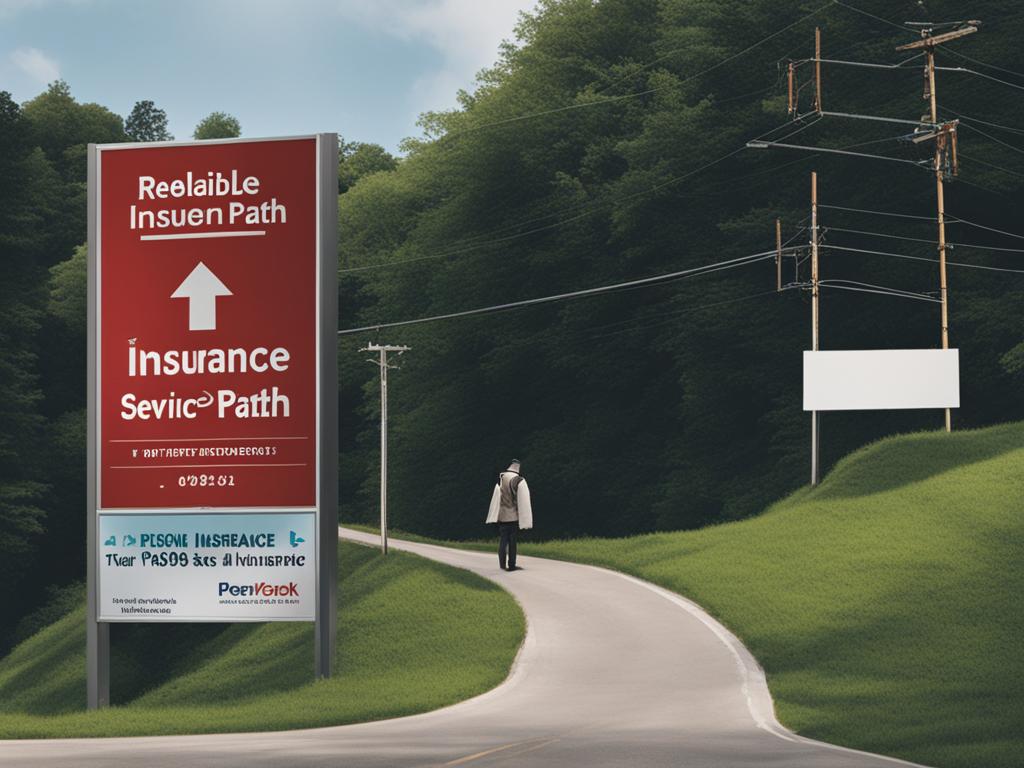Guide: How to Dispute a False Insurance Claim effectively
Dealing with a false insurance claim can be a frustrating experience. However, it’s important to know that you have options to challenge and dispute such claims. By understanding the process and taking appropriate steps, you can effectively navigate through the complexities of insurance claim disputes.
When your insurance company denies your claim or cancels your coverage, it’s essential to know your rights. You have the right to appeal their decision and have it reviewed by a third party. This guide will provide you with valuable information on how to dispute a false insurance claim effectively.
- Disputing a false insurance claim requires a thorough understanding of the process and your rights.
- Review your policy documents and gather evidence to support your claim.
- Consider seeking legal advice and exploring options like mediation or filing a lawsuit.
- Involving third parties such as ombudsmen or state regulators can help in resolving the dispute.
- Consulting with insurance agents and executives can provide guidance and assistance in the process.
Understanding Insurance Claim Disputes
Insurance claim disputes can be complex and challenging to navigate. Whether it’s a denied claim, unsatisfactory settlement, or a delay in processing, knowing how to challenge a false insurance claim is crucial. To successfully dispute an insurance claim, it’s important to understand the insurance claim dispute process, the steps involved, and how to prove that the claim is false.
Steps to Challenge a False Insurance Claim:
- Thoroughly review your policy documents: Familiarize yourself with the terms and conditions of your insurance policy to understand the coverage and requirements.
- Gather evidence: Collect all relevant documentation and evidence to support your claim. This may include photographs, medical records, repair estimates, witness statements, and any other pertinent information.
- Seek legal advice if needed: If you believe your claim has been wrongly denied or undervalued, consult with an attorney who specializes in insurance claim disputes. They can provide guidance on your rights and help you build a strong case.
To further strengthen your case, consider keeping a detailed record of all interactions with the insurance company, including dates, names of representatives, and summaries of conversations. This documentation can serve as evidence of your efforts to resolve the dispute.
“The burden of proof lies with the policyholder to demonstrate that the insurance claim is false or unjustly denied. By thoroughly reviewing your policy, gathering compelling evidence, and seeking legal advice when necessary, you can improve your chances of successfully challenging a false insurance claim.”
Gathering Evidence to Prove a False Insurance Claim
When disputing a false insurance claim, it’s crucial to provide compelling evidence that supports your position. The type of evidence required may vary depending on the nature of the claim. Here are some common types of evidence that can help prove a false insurance claim:
- Photographic evidence: Take clear and detailed photographs of any damage or incidents that occurred. Ensure that the photographs are timestamped if possible.
- Medical records: If the claim involves injuries or medical treatment, provide medical records, doctor’s reports, and any other relevant medical documentation.
- Expert opinions: In certain cases, it may be necessary to obtain expert opinions or reports to support your claim. This could involve hiring professionals such as engineers, appraisers, or medical experts.
- Witness statements: If there were any witnesses to the incident or event, gather their statements in writing or through recorded interviews. Witness testimony can be instrumental in proving the validity of your claim.
By presenting strong and compelling evidence, you can build a solid case to challenge a false insurance claim. It’s essential to gather all relevant documentation and consult with legal experts to ensure you have a comprehensive and persuasive argument.
Appealing a Denied Insurance Claim
When your insurance claim is denied, it can be a frustrating and stressful experience. However, it’s important to remember that you have options to challenge the decision and seek a reversal. Understanding the process of appealing a denied insurance claim is crucial in order to navigate through the complexities of the dispute.
Start by carefully reviewing your policy documents to familiarize yourself with the coverage and requirements. This will help you determine if the denial is valid or if there are grounds for challenging it. If you believe the denial is incorrect, you can explain your position to the insurance company and request a reconsideration of their decision.
It’s important to provide any supporting evidence or documentation that strengthens your case. This may include medical records, photos of damages, or witness statements. Presenting a strong argument backed by evidence can increase the likelihood of a successful appeal. In some cases, seeking legal advice from an experienced insurance attorney may be beneficial to ensure that you are fully aware of your rights and options.
External Review and Legal Options
If the insurance company refuses to reverse their decision after your appeal, it may be necessary to explore external review options. This involves taking your appeal to an independent third party who will review the case and make a final decision. The external review process varies depending on the type of insurance and the state you reside in, so it’s important to familiarize yourself with the specific requirements and procedures.
In certain situations, you may also need to consider legal action to dispute a false insurance claim. Consulting with an attorney who specializes in insurance disputes can provide you with valuable guidance and representation throughout the legal process. They can help you build a strong case, negotiate with the insurance company, and take the necessary steps to protect your rights.

| Steps to Appeal a Denied Insurance Claim | Things to Consider |
|---|---|
| Review your policy documents | Make sure you understand the coverage and requirements outlined in your policy |
| Present a strong argument | Provide supporting evidence and documentation to strengthen your case |
| Seek legal advice | Consult with an experienced insurance attorney to understand your options |
| Consider external review | If the insurance company does not reverse their decision, explore independent third-party review options |
| Explore legal action | If necessary, consult with an attorney to pursue legal recourse |
Remember, appealing a denied insurance claim can be a complex process. It’s important to be well-informed, gather relevant evidence, and seek expert guidance when necessary. By taking the necessary steps and remaining persistent, you can increase your chances of overturning the decision and receiving the coverage you deserve.
Dealing with an Insurance Claim Investigation
When filing an insurance claim, it’s important to be aware that insurance companies often conduct investigations to assess the validity of the claim. During an investigation, the company will gather evidence, review policy terms and conditions, and assess the extent of the damage or loss. It’s crucial to cooperate fully with the investigation process, providing any requested information or documentation in a timely manner. By doing so, you can demonstrate your commitment to resolving the claim efficiently and effectively.
If you feel the insurance claim investigation is unfair or biased, it’s advisable to seek legal advice to ensure that your rights are protected throughout the process. An attorney with expertise in insurance matters can help you understand the investigation process and provide guidance on how to navigate any challenges that may arise. They can advocate on your behalf and help you present a strong case based on the evidence available. Additionally, seeking legal representation can provide you with peace of mind and confidence as you navigate the complexities of an insurance claim investigation.
In an insurance claim investigation, it’s crucial to cooperate fully with the process and provide any requested information or documentation. If you feel the investigation is unfair or biased, seeking legal advice can help protect your rights and ensure a fair resolution.
Remember that insurance claim investigations are conducted to determine the validity of the claim and ensure that policy terms and conditions are upheld. By cooperating and providing the necessary information, you can demonstrate your willingness to resolve the claim in good faith. However, if you believe the investigation is being conducted unfairly or that your rights are being violated, it’s important to consult with a legal professional who can guide you through the process and ensure a fair and just resolution.
| Key Points to Remember |
|---|
| Cooperate fully with the insurance claim investigation process. |
| Provide any requested information or documentation promptly. |
| Seek legal advice if you feel the investigation is unfair or biased. |
| Consult with a legal professional to protect your rights throughout the investigation. |
By understanding the insurance claim investigation process and taking the necessary steps to protect your rights, you can ensure that your claim is handled fairly and effectively. Remember that seeking legal advice can provide valuable guidance and support throughout the investigation, helping you navigate any challenges that may arise and working towards a resolution that is in your best interest.
Seeking Assistance from Third Parties
If you find yourself unable to resolve a dispute directly with your insurance company, involving third parties can be a viable option. These third parties can provide support, mediation, and advocacy to help you navigate the complexities of an insurance claim dispute.
1. Ombudsman Services
One option is to seek assistance from an ombudsman. Ombudsmen are appointed by state departments of insurance and act as neutral parties who can investigate your complaint and work towards a resolution. They can advocate for fair treatment and ensure that the insurance company is abiding by regulations. If your agent or the insurance company’s manager is unable to address your concerns, contacting the ombudsman can be a valuable step.
2. State Insurance Regulators
Another avenue for assistance is filing a complaint with your state department of insurance. These regulators have the authority to investigate complaints and enforce insurance laws. By filing a complaint, you can bring your dispute to the attention of the appropriate authority and potentially receive assistance in resolving the issue.
3. Legal Representation
In more complex or challenging cases, seeking legal representation may be necessary. An attorney experienced in insurance claim disputes can provide valuable guidance, review your policy, and advocate on your behalf. They can help you navigate the legal process and improve your chances of reaching a fair resolution.
Remember, the goal is to find a resolution that is fair and satisfactory to both parties. By involving third parties who can provide support and oversight, you can increase the likelihood of reaching a favorable outcome in your insurance claim dispute.
Involving Insurance Agents and Executives in Claim Disputes
When it comes to resolving claim disputes, insurance agents and executives can play a crucial role in assisting policyholders. These professionals have the knowledge and expertise to navigate the complexities of the insurance industry and advocate for fair treatment. If you find yourself in a dispute with your insurance company, involving your agent or escalating the matter to their superiors can be a productive step towards finding a satisfactory resolution.
Your insurance agent should be your first point of contact when facing a claim dispute. Reach out to them and explain the issue you are facing. Agents are well-versed in policy terms and conditions, and they can provide valuable insights into the claims process. They can also guide you through the steps to escalate the matter within the insurance company.
If your agent is unable to resolve the dispute, it may be necessary to involve higher-level executives within the insurance company. Engaging with a manager or supervisor can bring a fresh perspective to the situation and potentially lead to a more favorable outcome. These individuals often have more authority and may be able to intervene on your behalf.

Why Involve Insurance Agents and Executives?
Insurance agents and executives have a vested interest in maintaining strong relationships with their policyholders. They understand that providing excellent customer service and fair claim settlement is essential for long-term success. By involving these professionals in claim disputes, you can leverage their expertise and influence to resolve issues more efficiently.
Furthermore, agents and executives have a thorough understanding of insurance policies, coverage, and claims procedures. Their knowledge can be invaluable when interpreting policy language, ensuring that your rights as a policyholder are protected throughout the dispute resolution process.
In summary, when encountering a claim dispute, don’t hesitate to engage with your insurance agent. They can provide guidance and advocacy, and if necessary, escalate the matter to higher-level executives within the company. By involving these professionals, you increase your chances of achieving a fair and satisfactory resolution to your claim dispute.
Utilizing Ombudsman Services
When it comes to resolving insurance disputes, ombudsmen can be valuable resources. These neutral parties are appointed by state departments of insurance to investigate consumer complaints and work towards a resolution. If you have exhausted other avenues of resolution, contacting the ombudsman can offer a fresh perspective and potential assistance in navigating your dispute.
Ombudsmen act as advocates for fair treatment and ensure that insurance companies are abiding by regulations. They can investigate your complaint, review relevant documents, and mediate discussions between you and the insurance company. By utilizing their services, you can have a neutral party assess the situation and help facilitate a satisfactory resolution.
When dealing with an insurance dispute, it’s essential to remember that ombudsmen are there to help. Their role is to promote fairness and hold insurance companies accountable for their actions. If you are unable to reach a resolution through your insurance agent, the insurance company’s manager, or other means, turning to the ombudsman can provide an additional avenue for assistance.

Remember, each state may have its own specific process for engaging with ombudsmen. It’s important to check your state’s department of insurance website for information on how to contact and work with an ombudsman in your area. By utilizing their services, you can increase your chances of resolving your insurance dispute in a fair and satisfactory manner.
Filing a Complaint with State Regulators
If you are unsatisfied with the outcome of your insurance claim dispute, you have the option to file a complaint with the appropriate state department of insurance. This regulatory body is responsible for overseeing insurance companies and ensuring they comply with state laws and regulations. Filing a complaint can be a strategic step to bring attention to your case and seek resolution.
When filing a complaint, it is important to provide detailed information about your dispute, including relevant policy details, claim documents, and any communication with the insurance company. Clearly outline the issues you are facing and the desired outcome. The state department of insurance will review your complaint and may launch an investigation to determine if any violations of insurance laws have occurred.
Keep in mind that the resolution of your complaint will vary depending on the specific circumstances and regulations in your state. The state department of insurance may work towards facilitating a resolution between you and the insurance company, or they may take enforcement actions against the insurer if violations are found. It is essential to cooperate and provide any requested information to ensure a thorough investigation.
| Benefits of Filing a Complaint with State Regulators | Considerations Before Filing a Complaint |
|---|---|
|
|
“Filing a complaint with state regulators can be a strategic step to bring attention to your case and seek resolution.”

State Complaint Ratios: A Useful Indicator
When selecting an insurance provider, it can be helpful to consider their complaint ratios, which indicate the level of complaints received by the state department of insurance. These ratios provide insights into the company’s customer service and claims handling practices. Higher complaint ratios may indicate a higher likelihood of disputes and unsatisfactory outcomes. You can typically find complaint ratio information on the state department of insurance’s website or by contacting their office directly.
It’s important to note that complaint ratios should not be the sole factor in your decision-making process. Consider other aspects such as the company’s financial stability, reputation, and the coverage options they offer. Consulting with an insurance lawyer can also provide valuable guidance and ensure you are selecting the right insurance company for your needs.
Considering Arbitration for Dispute Resolution
Arbitration is a common method of resolving insurance claim disputes. It offers a faster and more cost-effective alternative to traditional litigation. In arbitration, a neutral third party, known as an arbitrator, reviews the evidence and makes a decision that is binding or non-binding, depending on the terms of your policy. This process allows for a more expedited resolution and avoids the need for a lengthy court trial.
Arbitration can be a beneficial option when dealing with insurance claim disputes. It provides a more informal setting compared to a courtroom, allowing for a more collaborative and less adversarial approach. Additionally, the decision made by the arbitrator is generally final, providing a sense of closure to the dispute.
“Arbitration offers a more streamlined and efficient process for resolving insurance claim disputes. It allows both parties to present their arguments and evidence in a less formal setting, promoting a more equitable resolution.”
It’s important to review your insurance policy to determine if it includes an arbitration clause. If it does, you may be required to engage in arbitration before pursuing other options. Understanding the arbitration process outlined in your policy is crucial. If you are unsure or have any questions, consulting with legal counsel can provide the necessary guidance.
| Advantages of Arbitration in Insurance Claim Disputes | Disadvantages of Arbitration in Insurance Claim Disputes |
|---|---|
|
|

Arbitration can provide a fair and efficient method for resolving insurance claim disputes. However, it’s essential to carefully weigh the advantages and disadvantages before proceeding. Consulting with legal experts can help you navigate the arbitration process and ensure that your rights are protected throughout the resolution.
Seeking Legal Representation
In complex or large-scale insurance claim disputes, it may be necessary to hire a lawyer with expertise in insurance matters. An attorney can provide guidance on your rights, review your policy, and help navigate the legal process. They can advocate on your behalf and work towards a favorable resolution. Getting legal advice early in the dispute can help you build a strong case and improve your chances of success.
Hiring a lawyer for insurance claim disputes is a strategic decision that can significantly impact the outcome of your case. A skilled attorney will have a deep understanding of insurance laws and regulations, as well as experience dealing with insurance companies. They can leverage their knowledge and negotiation skills to effectively challenge the denial or unsatisfactory settlement of your claim.
When searching for a lawyer, consider their expertise in insurance law specifically. Look for attorneys who have successfully handled similar cases in the past and have a track record of achieving favorable outcomes for their clients. It’s crucial to find an attorney who is responsive, communicative, and transparent about their fees and billing structure.

Benefits of Hiring a Lawyer for Insurance Claim Disputes
- A lawyer can assess the strength of your case and recommend the best course of action.
- They can handle all communication and negotiation with the insurance company on your behalf.
- An attorney can gather evidence, interview witnesses, and build a compelling argument to support your claim.
- If necessary, they can represent you in court and litigate your case effectively.
- Hiring a lawyer can relieve the stress of navigating complex legal processes and ensure that your rights are protected.
“Having a skilled lawyer on your side can level the playing field and significantly increase your chances of obtaining a fair and just resolution to your insurance claim dispute.” – Insurance Claim Expert
Finding the Right Insurance Company
Choosing the right insurance company is crucial in avoiding potential insurance claim disputes. To ensure you make an informed decision, it’s important to thoroughly research and evaluate insurance providers. Consider the following factors when selecting an insurance company:
- Reputation: Look for insurers with a solid reputation and a history of providing excellent customer service. Online reviews and recommendations from trusted sources can help gauge the reputation of different companies.
- Complaint Ratios: Check the complaint ratios of insurance companies in your region. This information is often available through state insurance department websites and can give you insights into how responsive and reliable a company is in addressing policyholders’ concerns.
- Coverage Options: Carefully review the coverage options offered by different insurers. Ensure that the policies are comprehensive and align with your specific needs.
While finding the right insurance company can significantly reduce the likelihood of claim disputes, it’s essential to keep in mind that even with a reputable insurer, disagreements can still arise. Reading and understanding the terms and conditions of your policy before making a decision is crucial. If you have any doubts or questions, consult with an insurance lawyer who can provide valuable insights and help you make an informed choice.

By taking the time to research and choose the right insurance company, you can minimize the risk of insurance claim disputes and ensure that you have the coverage you need. Remember to review reputation, complaint ratios, and coverage options when evaluating insurers. Consult with an insurance lawyer if necessary to ensure that you fully understand your policy and make the best decision for your individual circumstances.
Conclusion
Disputing a false insurance claim can be a challenging and complex process. To effectively challenge a denial or unsatisfactory settlement, it is crucial to understand your rights, review policy documents, gather evidence, and seek appropriate guidance. By taking these proactive steps, you can protect your rights and work towards a fair resolution.
If your insurance company denies your claim or cancels your coverage, you have the right to appeal their decision and have it reviewed by a third party. Internal appeals and external reviews are two ways to challenge a false insurance claim. Internal appeals allow you to ask your insurance company for a full and fair review, while external reviews involve taking your appeal to an independent third party.
In addition to internal appeals and external reviews, you may need to consider legal options for disputing a false insurance claim. This can include seeking legal representation, filing a lawsuit, or exploring arbitration if it is included in your policy. Consulting with legal experts can provide valuable advice and support throughout the dispute resolution process.
Remember to be proactive and well-informed when disputing a false insurance claim. Understanding the insurance claim dispute process and the available legal options can help you navigate the complexities of the system. By staying informed and seeking appropriate guidance, you can increase your chances of getting a fair outcome in your insurance claim dispute.
FAQ
How can I dispute a false insurance claim effectively?
To dispute a false insurance claim effectively, it’s important to thoroughly review your policy documents, gather evidence to support your claim, and consider seeking legal advice. You can also utilize internal appeals, external reviews, and involve third parties like ombudsmen or state regulators if necessary.
What are common reasons for insurance claim disputes?
Insurance claim disputes can arise due to claim denials, unsatisfactory settlements, and delays in processing claims. It’s important to understand your policy’s terms and conditions and gather evidence to support your claim.
How can I appeal a denied insurance claim?
You can appeal a denied insurance claim by requesting an internal review from your insurance company or pursuing an external review through an independent third party. It’s important to understand the appeals process, provide supporting evidence, and consider legal options if necessary.
What should I do during an insurance claim investigation?
During an insurance claim investigation, it’s important to cooperate with the process, provide requested information or documentation, and seek legal advice if you feel the investigation is unfair or biased.
How can I involve third parties in my insurance claim dispute?
If you are unable to resolve a dispute directly with your insurance company, you can involve third parties like ombudsmen or state regulators. They can act as advocates, investigate your complaint, and work towards a resolution.
How can insurance agents and executives help in resolving claim disputes?
Insurance agents and executives can assist in resolving claim disputes by providing guidance, advocating on your behalf with the insurance company, and escalating the matter to higher authorities if necessary.
How can I utilize ombudsman services in insurance disputes?
Ombudsmen are neutral parties appointed by state insurance departments to help resolve consumer complaints. You can contact an ombudsman to investigate your complaint, mediate the dispute, and ensure fair treatment by the insurance company.
How do I file a complaint with state insurance regulators?
If you are unsatisfied with the outcome of your dispute, you can file a complaint with your state department of insurance. They will investigate the matter, allow the insurance company to present their view, and take appropriate enforcement actions if violations are found.
What is arbitration and how can it be used in insurance claim disputes?
Arbitration is an alternative dispute resolution process. If your policy includes an arbitration clause, you may be required to engage in arbitration before pursuing other options. A neutral third party reviews the evidence and makes a binding or non-binding decision.
Should I hire a lawyer for insurance claim disputes?
In complex or large-scale insurance claim disputes, it may be necessary to hire a lawyer with expertise in insurance matters. An attorney can provide guidance on your rights, review your policy, advocate on your behalf, and navigate the legal process.
How can I choose the right insurance company to minimize the risk of claim disputes?
To minimize the risk of claim disputes, research the reputation, complaint ratios, and customer reviews of insurance companies. Understand the terms and conditions of the policy before making a decision, and consult with an insurance lawyer to ensure appropriate coverage.

